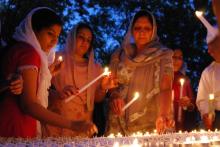american ideals

THE CAPTAIN AMERICAseries has always been a bright spot in the Marvel Cinematic Universe. Sure, they’re big blockbuster fun, but they’ve also been willing to do what political thrillers do best: Consider the questions of power. Previous entries have interrogated the perils of the surveillance state and the historic experimentation done on Black soldiers, political waters that few MCU projects have ventured into.
Which is why it’s such a shame that Captain America: Brave New World — hampered by reshoots, strikes, protests, and a tepid rollout amid Donald J. Trump’s reascendance to the presidency — offers only the veneer of substance.
When President Thaddeus “Thunderbolt” Ross (Harrison Ford) asks newly christened Captain America Sam Wilson (Anthony Mackie) to restart The Avengers, Wilson is apprehensive. Ross, a former military general, helped dismantle the team in Captain America: Civil War, imprisoning Wilson and other heroes. But when U.S. operatives attempt to assassinate Ross, Wilson must work with the increasingly untethered president to uncover who’s behind the plot.
A film about the tension between serving your country and serving your president, particularly in our current moment where paranoia and disunity reign, is rich with possibility. But instead of engaging these pertinent issues, the film seems to wave away concerns about the danger of political power, filling its runtime with clunky dialogue that alludes to complex ideas without engaging them, lest they reduce the film’s marketability.

Imagine the terror.
You are in a temple, a safe, sacred place, preparing for a morning service. In the kitchen, you are busy cooking food for lunch, while others read scriptures and recite prayers. Friends begin to gather for the soon-to-start service.
At the front door, you smile at the next man who enters. He does not smile back. Instead, he greets you with hateful stare and bullets from his gun.
Such was the scene Sunday at a Sikh gurudwara in Oak Creek, Wis., just south of Milwaukee, where a gunman, Wade Michael Page, killed six and critically injured three others before being shot down by law enforcement agents.
As Page began his shooting spree, terrified worshippers sought shelter in bathrooms and prayer rooms. Rumors of a hostage situation surfaced, and those trapped inside asked loved ones outside not to text or call their cell phones, for fear that the phone ring might give away their hiding place.
The first police officer to arrive on the scene stopped to tend to a victim outside the gurudwara. He looked up to find the shooter pointing his gun directly at him, and then took several bullets to his upper body. He waved the next set of officers into the temple, encouraging them to help others even as he bled.
That magnanimity is a common theme among the stories of victims and survivors of the Wisconsin shootings. Amidst terror and confusion, Sikhs offered food and water to the growing crowd of police and news reporters outside the gurudwara as part of langar — the Sikh practice of feeding all visitors to the house of worship.
In the wake of the tragic bombing in Norway this past weekend, we are left with an unsettling picture of the state of anti-Islamic sentiments in the United States. There were broad attempts to blame the bombings on Islamic terrorism before all of the facts of the attack were out, and even after the attacker became known as Anders Behring Breivik, a self-proclaimed Christian extremist, the discussion focused on Breivik's statement that he was responding to the threat Muslims pose in Europe.